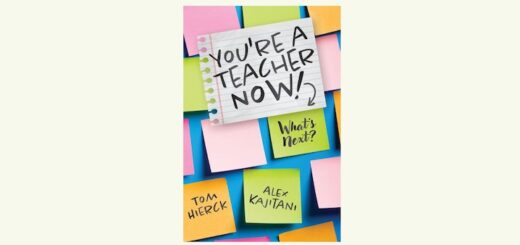The Co-Teacher’s Common Core Reality Check
A MiddleWeb Blog
Back in July, I wrote about my vision for co-teaching and the Common Core. Now that I am back in the full swing of the school year, I think it’s time for a Common Core check-up to put my July vision to the test.
If you’ve been following my blog, you already know that my choice to embrace the Common Core standards is solid.
I believe in the depth and the concentration that a Common Core curriculum has to offer. It encourages students to think deeply and think independently, and most important, it offers students a chance to really own their learning, trust their own thinking and take charge of the information that is presented in today’s classrooms.
In addition, students have the chance to transfer meaningful knowledge and learning processes they gain as they embark on their way to becoming expert learners for life. It really is a beautiful thing.
Then there’s the testing . . .
I have yet to come across an educator who does not agree with the Common Core approach to more challenging standards. The disagreements arise only when we think about the high stakes testing that goes along with the Common Core package. The testing (at least in my state and many others) does not align with the fact that the instructional shifts have just begun.
We need to consistently ramp up the instructional process over time before we test students in new ways and for higher levels of learning. Teachers and students need to become savvy with new ways of learning and testing. It is just common sense…and shouldn’t this common sense approach be a natural blend with the Common Core? One would think.
So what do I do?
I continue to stay focused on the instructional process, on meaningful and formative assessments, and on my students who are individual thinkers with individual abilities who are eager to be encouraged and supported to reach their personal best.
My philosophy is that as teachers follow the Common Core curriculum and become adept at teaching it, the testing will take care of itself. If we do this right, testing will be largely stress free because true learning is invigorating—not stressful. The focus should be on passionate learning.
 My first two weeks have been quite a remarkable journey. I have experienced so much professional growth in these last ten days of school. As I juggle my many, many special education tasks, I am also embracing the curriculum — four main content areas — as well as my study skills class.
My first two weeks have been quite a remarkable journey. I have experienced so much professional growth in these last ten days of school. As I juggle my many, many special education tasks, I am also embracing the curriculum — four main content areas — as well as my study skills class.
With four subject areas, four very different co-teaching experiences, and a necessary concentration on study skills and organization, my head was spinning after the first week. Here are some real questions that kept me up at night:
• How am I going to teach the intense curriculum, while also teaching students to be organized?
• How should I teach those learners who lack the background knowledge needed to grasp current concepts?
• How should I teach learners who have difficulty keeping up with the curriculum?
• How will I make sure that my special needs students’ IEP goals are aligned well each day?
• How will I monitor the progress of students’ learning?
• How will I juggle my special educator responsibilities with whole-class teaching in my inclusion classrooms?
• How can one special education teacher be expected to do it all? I am teaching all subject areas on my 7th grade team (math, science, social studies, English—and study skills). How will I juggle my role as special educator with my role of teaching the Common Core—seemingly taking on some of what was once considered the general educator’s role?
Seeking solutions
I love that the line that defines the roles of special educators and general educators is blurring. But it IS a major mind shift – one I’m determined to accomplish. And so the questions that kept me up at night after my second week of school evolved into something more like solution-seeking strategies. And my thoughts looked more like this:
 • I am so thankful that most of my co-teachers are eager to meet with me and collaborate on lessons in preparation for our instructional time.
• I am so thankful that most of my co-teachers are eager to meet with me and collaborate on lessons in preparation for our instructional time.
• I am so thankful that most of my co-teachers are opening up their minds to other ways of doing things. (As my readers know, I am moving forward with implementing a Universal Design for Learning mindset—and some of my co-teachers are coming along for the ride!)
• I am so thankful that some of my co-teachers use the language like “our” students and “we” throughout all communications.
• I am thankful for my focused determined self—to embrace challenges, step out of my comfort zone when necessary, and always seek solutions.
• I am relentlessly researching and applying strategies to help all students achieve (which will be the topic for a future blog post in the coming months).
Needless to say, I am up late each night. I am studying the lessons we are teaching ahead of time; I am planning specific lessons; I am studying and analyzing IEP goals and specific accommodations. Most important: I am never losing sight that all I do is for the purpose of leading my students—all students on my team—to meet with their personal best to succeed.
In an upcoming blog post I will be sharing a co-teaching model called PACT, which was created by two retired teachers in my district. PACT is the philosophical basis for all co-teachers in my district. I’ll also share my interview with these co-teaching gurus! Great discussions ahead. Stay tuned!
How are you co-teaching with the Common Core? What questions and solutions are keeping you up at night?
Be sure to join #coteachat this Tuesday, September 24 from 8:00 to 8:45 EDT. The topic is…you guessed it…Co-teaching and the Common Core. Come join and share your voice!



































Critical thinking has always been an essential in the classroom. Common Core did not invent it. The approach to teach students, or anyone to trust themselves is mistaken, people are often wrong and don’t know it. Also, Compton’s assertion that children should read without being given context and background is not reasonable nor logical. Finally, the CCSS and CCSS testing does not address the complexity and diversity of each classroom and school across the entire nation, not the needs of ELL and special education students. We could also have an entire discussion of the cost ($30 billion+), the money being made by Pearson, and the politicians in bed with the company. Oh, and the errors and advertising within the test. http://pointeviven.blogspot.com/2013/06/the-common-core-shift-misunderstanding.html
x: You make some great points. Clearly critical thinking has been around a very long time…and thanks to the great work of educational researchers like Bloom, Vygotsky, etc…teachers have been implementing best practices in their classrooms for so many years. What’s exciting about the Common Core is that it is now consistently expected in all classrooms. The consistency of students being taught how to think will prevail over the all too familiar teaching the students what to think.
You also make a strong case for the urgency for teachers to focus on the strengths and needs of their students. It’s all about the instruction. As for students with special needs–teachers must align the content, process, standards, and IEP goals with the skill level that the students are currently at. Once they enter this learning point…they may be nudged deeper into the learning process.
Thanks for your comment!